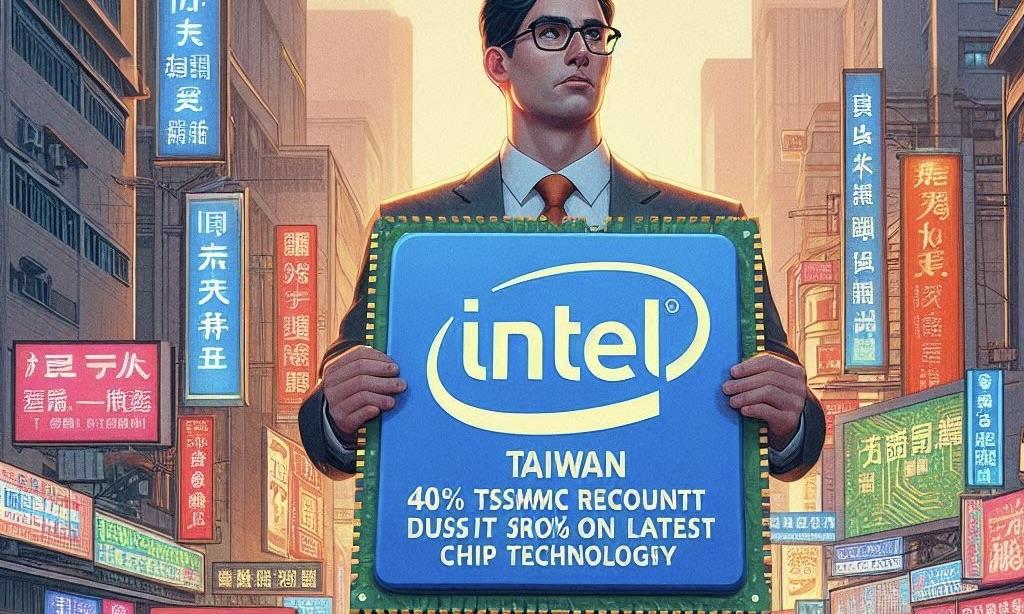Intel CEO Patrick Gelsinger’s remarks about Taiwan’s stability reportedly strained ties with TSMC, leading to the loss of a 40% discount on its advanced 3-nanometer chip technology. TSMC’s rescinded offer forces Intel to face steeper production costs amid its efforts to compete in the global semiconductor market.
Intel Aims to Reclaim Chipmaking Leadership but Faces Pushback from TSMC's Chang
Intel CEO Patrick Gelsinger’s comments about Taiwan Semiconductor Manufacturing Company’s (TSMC) manufacturing presence in China reportedly strained relations between the two firms, ultimately causing Intel to miss out on significant discounts TSMC had offered. According to a recent Reuters report, TSMC had extended a 40% discount to Intel on its 3-nanometer manufacturing technology—an offer later rescinded following Gelsinger’s remarks.
Under Gelsinger's leadership, Intel has focused on regaining its status in the global chip manufacturing sector. It has set up a contract manufacturing division to compete with TSMC while simultaneously outsourcing some production needs to the Taiwanese firm. In 2021, TSMC’s 3-nanometer technology was the leading-edge chip manufacturing process, with the base cost of a wafer at $23,000. TSMC’s 40% discount would have reduced Intel’s price to around $14,000 per wafer.
At the time, Intel was actively pursuing U.S. government subsidies for its advanced manufacturing initiatives. Gelsinger underscored the geopolitical risks tied to Taiwan’s dominance in advanced chip manufacturing as part of this strategy. His comments at the Fortune Brainstorm Tech Conference in California included pointed remarks about Taiwan’s stability, questioning, “Does that make you feel more comfortable or less?” These statements drew a swift response from TSMC’s founder, Dr. Morris Chang, who publicly criticized Gelsinger’s approach, suggesting his focus was more on securing subsidies than outlining a clear competitive strategy. Chang advised that if Gelsinger aimed to compete with TSMC, he should focus on the firm’s vulnerabilities rather than airing concerns about Taiwan’s stability.
Intel Faces Profit Strain as TSMC Ends Discount, AI Sales Falter, and 18A Delays Loom
TSMC’s executives were unimpressed, and the strained relations led to the withdrawal of Intel’s discount, forcing the company to absorb the total cost for 3-nanometer products, which impacted its profit margins. Additionally, Reuters reports that Gelsinger’s projections for AI chip sales were more optimistic than internal expectations. Intel had to cancel a self-driving chip deal with Alphabet, incurring a penalty fee after the threat of legal action.
Intel and Alphabet declined to comment on the canceled deal. Meanwhile, an internal planning document from an Intel supplier, cited by Reuters, hints at potential delays in Intel’s 18A manufacturing process. Industry sources doubt that 18A will be ready for high-volume production by 2026. Qualcomm and Apple have reportedly declined to adopt the technology, citing technical concerns. Despite this, Intel maintains that the 18A process will launch next year, aiming to reclaim its leadership in advanced semiconductor technology.



 Tencent Shares Slide After WeChat Restricts YuanBao AI Promotional Links
Tencent Shares Slide After WeChat Restricts YuanBao AI Promotional Links  Sam Altman Reaffirms OpenAI’s Long-Term Commitment to NVIDIA Amid Chip Report
Sam Altman Reaffirms OpenAI’s Long-Term Commitment to NVIDIA Amid Chip Report  SoftBank and Intel Partner to Develop Next-Generation Memory Chips for AI Data Centers
SoftBank and Intel Partner to Develop Next-Generation Memory Chips for AI Data Centers  Palantir Stock Jumps After Strong Q4 Earnings Beat and Upbeat 2026 Revenue Forecast
Palantir Stock Jumps After Strong Q4 Earnings Beat and Upbeat 2026 Revenue Forecast  Sony Q3 Profit Jumps on Gaming and Image Sensors, Full-Year Outlook Raised
Sony Q3 Profit Jumps on Gaming and Image Sensors, Full-Year Outlook Raised  Nvidia CEO Jensen Huang Says AI Investment Boom Is Just Beginning as NVDA Shares Surge
Nvidia CEO Jensen Huang Says AI Investment Boom Is Just Beginning as NVDA Shares Surge  Jensen Huang Urges Taiwan Suppliers to Boost AI Chip Production Amid Surging Demand
Jensen Huang Urges Taiwan Suppliers to Boost AI Chip Production Amid Surging Demand  SpaceX Updates Starlink Privacy Policy to Allow AI Training as xAI Merger Talks and IPO Loom
SpaceX Updates Starlink Privacy Policy to Allow AI Training as xAI Merger Talks and IPO Loom  SpaceX Prioritizes Moon Mission Before Mars as Starship Development Accelerates
SpaceX Prioritizes Moon Mission Before Mars as Starship Development Accelerates  AMD Shares Slide Despite Earnings Beat as Cautious Revenue Outlook Weighs on Stock
AMD Shares Slide Despite Earnings Beat as Cautious Revenue Outlook Weighs on Stock  Anthropic Eyes $350 Billion Valuation as AI Funding and Share Sale Accelerate
Anthropic Eyes $350 Billion Valuation as AI Funding and Share Sale Accelerate  Amazon Stock Rebounds After Earnings as $200B Capex Plan Sparks AI Spending Debate
Amazon Stock Rebounds After Earnings as $200B Capex Plan Sparks AI Spending Debate  Global PC Makers Eye Chinese Memory Chip Suppliers Amid Ongoing Supply Crunch
Global PC Makers Eye Chinese Memory Chip Suppliers Amid Ongoing Supply Crunch  SpaceX Reports $8 Billion Profit as IPO Plans and Starlink Growth Fuel Valuation Buzz
SpaceX Reports $8 Billion Profit as IPO Plans and Starlink Growth Fuel Valuation Buzz  Nintendo Shares Slide After Earnings Miss Raises Switch 2 Margin Concerns
Nintendo Shares Slide After Earnings Miss Raises Switch 2 Margin Concerns  SoftBank Shares Slide After Arm Earnings Miss Fuels Tech Stock Sell-Off
SoftBank Shares Slide After Arm Earnings Miss Fuels Tech Stock Sell-Off 































